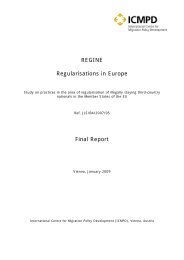taxud/2414/08 - European Commission - Europa
taxud/2414/08 - European Commission - Europa
taxud/2414/08 - European Commission - Europa
Create successful ePaper yourself
Turn your PDF publications into a flip-book with our unique Google optimized e-Paper software.
In a second step this approach was refined to cover with more precision only the supply<br />
of any constituent element of an exempted insurance or financial service, which<br />
constitutes a distinct whole and has the specific and essential character of the exempt<br />
service. This concept made clear that only elements of exempted insurance or financial<br />
services qualify; elements which are not part of such services are excluded. Even more, it<br />
must be constituent; this is a first filter and means that it must have one or more "genetic<br />
markers" of an exempt service making it recognisable as an element of an exempt<br />
financial or insurance service. Where this recognition is not possible, the service does not<br />
qualify. The service passing this first filter must constitute a distinct whole and have the<br />
specific and essential character of an exempt service to qualify for the exemption.<br />
Example 1: General book-keeping services have always been done within an insurance<br />
company by its employees. For cost reasons that book-keeping is outsourced to the<br />
insurance's tax consultant and is now being supplied and invoiced by the tax consultant<br />
to the insurance company; such services would not represent a constituent element of an<br />
insurance service; in fact, it does not have any "genetic marker" which would make it<br />
recognisable as such a part of an insurance service;<br />
Example 2: A bank has developed and supplies as a part of its bank account operation<br />
services personalised security software to its account holders; this software interacts with<br />
the bank's computer systems and enables the account holders to make, via their own<br />
computer, currency exchanges on their specific account in a safe environment where<br />
third parties are blocked out; the supply of these account operation services would be<br />
exempted from VAT as a financial service under the new draft Articles 135 (1) (c) and<br />
135a (5) of Council Directive 112/2006/EC and with it the supply of software as a<br />
constitutive but ancillary element of the account operation service.<br />
With software development becoming more sophisticated and expensive, the bank<br />
decides to outsource banking software development; a software company now improves<br />
the software for bank account operations and invoices its services to the bank. The bank<br />
itself continues to supply this improved personalised security software as a part of its<br />
bank account operation services to its account holders.<br />
Let's at first look at the relation between the software supplier and the bank: The<br />
improving of that banking software done by the software company is a service which<br />
remains a constituent element of bank account operations because its purpose remains to<br />
organise currency exchanges for bank account holders. As a sort of specialised software<br />
it still has a "genetic marker" linking it to an exempt financial service. However, it is no<br />
longer a part of such a financial service; it has been separated from that financial service<br />
and become a distinct whole and therefore a distinct service in its own. But it no longer<br />
has the specific and essential character of an exempt service (bank account service). On<br />
the contrary, it represents a mere technical supply and is therefore explicitly excluded<br />
from the VAT exemption under Article 13 (2) (i) of the draft Regulation.<br />
In a second step let's look at the relation between the bank and its account holders: Here<br />
nothing has changed. The bank still supplies account operation services exempted from<br />
VAT as a financial service under the new draft Articles 135 (1) (c) and 135a (5) of<br />
6
















